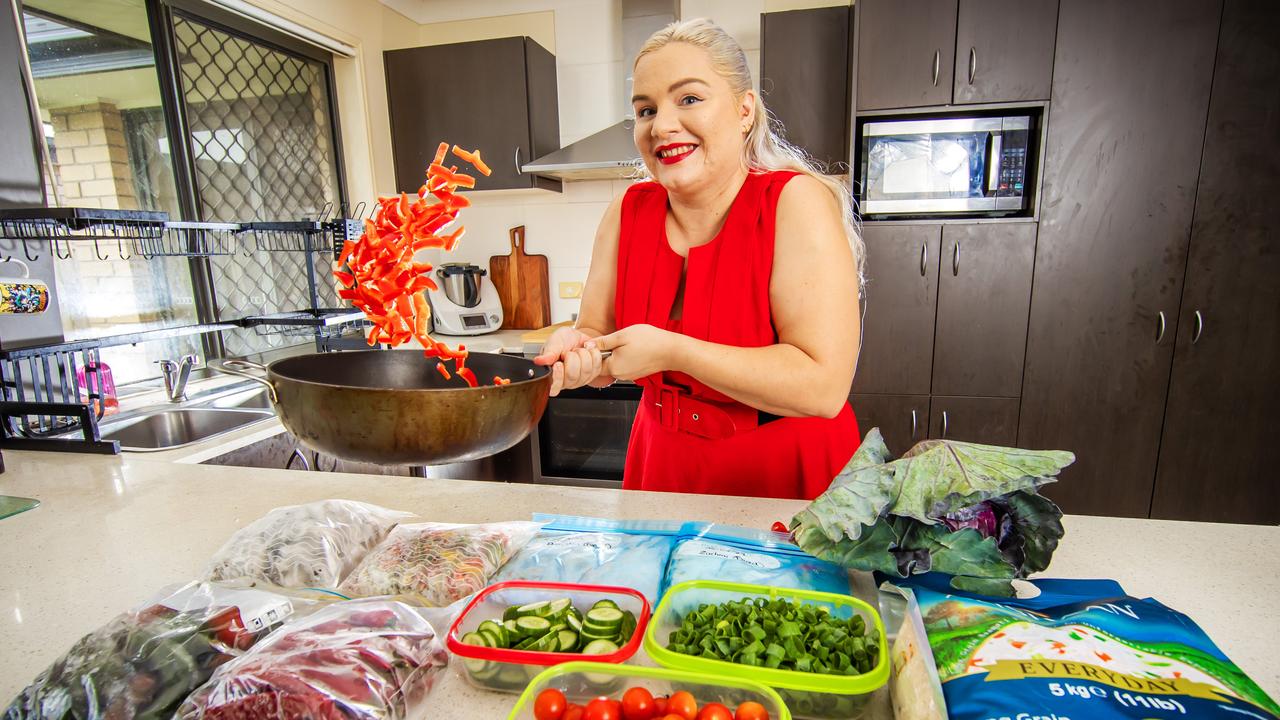How to slash your grocery bill by $60 a week
As the cost of living spirals with families spending more than ever on groceries, experts have revealed how to save thousands of dollars at the checkout each year. SEE HOW

QLD News
Don't miss out on the headlines from QLD News. Followed categories will be added to My News.
Want to slash at least $60 a week off your grocery bill, saving you thousands of dollars a year?
With the average Australian household now forking out $209 each week at the checkout, according to comparison website Finder, four in five of us are trying to find ways to cut back on supermarket spending.
But it doesn’t have to be hard, say online grocery gurus.
Tasmanian mum of three teenagers Chelsea Goodwin has become famous on Facebook for her $10 meals and cookbook of the same name, and says preparation is key to saving big.
“Before you go to do your grocery shop, you have a plan, you’ve written a list,” she says.
“You know what you’re going to be cooking and you know what you’re doing with your leftovers and leftover ingredients. It’s a great way to sort of cut $20 or $30 off your grocery spend each week.”
She plans for multiple meals during the week using the same ingredients, whether that be zucchini, capsicum or tinned tomatoes, and looks to use a base recipe that can be repurposed into new dishes with a few tweaks.

“Saving money on your groceries is all good and well, but what I see is that a lot of Australians their problem area is actually the food that they’re wasting and that is what’s affecting their budget more than the cost of groceries,” Ms Goodwin says.
By cooking a spaghetti bolognese one night that turns into burritos the next, and san choy bao the following evening, she says it’s easy to cut waste and save a fortune.
While 16 per cent of Aussies are reducing their meat consumption to save money, Ms Goodwin insists being on a budget doesn’t have to mean going without the popular protein.
“I think it’s such a fallacy that you can’t eat meat if you’re on a budget,” Ms Goodwin said.
“It just might mean you have to look at purchasing different cuts of meat and I think there’s so much that you can do with a pork shoulder or a lamb leg or a whole chicken where you can perhaps even stretch that over multiple meals during the week.”
Her tip is to keep meat purchases under $15/kg, looking to cuts like oyster blade, chuck, shoulder and leg, and recommends seeking out discount butchers for great deals, or even buying a whole beast direct from a farmer, which can deliver a range of cuts that can be kept in the freezer or split among friends and family.
Goodwin also suggests shopping from farm gates if possible, or buying imperfect produce boxes, like Funky Food or Good Fugly, which come direct from farmers and include produce that doesn’t meet the strict aesthetic standards of supermarkets.
“Often what you’ll find is that it might be a small saving, but you’re getting a product that’s of a higher quality if you are buying direct from a farmer,” says Ms Goodwin, adding that buying produce that’s in season is the best for price and quality.

Queensland mum and bargain influencer behind social media account Aussie Debt Free Girl, Emily Smith, feeds her family of five for less than $100/week, with an extra $50 for the likes of toiletries, cleaning products and pet food.
She says buying in bulk from discount green grocers is a great way to “lock in” a cheap price on veggies that you use often, such as zucchini or carrots. Any left over at the end of the week she recommends chopping up and freezing, ready to be incorporated into future meals, which slashes cooking time as everything is pre-prepared.
“It’s now a convenience item and that food that I’ve already spent the money on doesn’t go to waste,” she says.
She says meals should always be structured around what ingredients in your fridge or pantry need to be used first to prevent waste, and suggests taking a photo of your fridge and pantry before going shopping so you don’t buy things you already have.
For bread, Mrs Smith recommends looking to your local bakery for cheap specials at the end of each day, with some marking down their loaves to about $2.
“That way you’re getting nice bakery bread for the same price as supermarket home brand,” she said.
But both women agree, when it comes to specials and markdowns, only buy what you need or you’ll overspend.
For non-edible items like cleaning supplies and toiletries, half price supermarket specials are a great option, while Ms Goodwin also recommends looking at online retailers, such as Amazon or Chemist Warehouse, which offer good bulk prices.

Both women and Finder financial expert Sarah Megginson are also fans of supermarket loyalty programs, such as Woolworths Everyday Rewards or Coles Plus, and say these can save a small fortune thanks to the 10 per cent off a shop once a month bonus.
“If you can get these discounts it can take a big burden off your supermarket spending,” says Mrs Megginson, who insists it’s best to use the discount on your biggest shop of the month that usually includes household items like cleaning products, batteries and bathroom supplies.
With Mrs Smith adding that last year her Woolworths Rewards program saved her $500, which she used to cater Christmas.
Comparing products based on the per millilitre or gram price is also a must, say the experts, but warn that the home brand offer is not always the best. They say most things can be swapped out, but for quality, don’t skimp on the likes of toilet paper, paper towel, olive oil or pasta as the product is usually inferior. However, the home brand organic range can be a good cheap substitute.
While saving money can seem overwhelming to some, Mrs Smith insists it need not be.
“It’s one small change this week and then next week it’s another little change and suddenly a year down the track you’re in a completely different place financially,” she says.
Originally published as How to slash your grocery bill by $60 a week







